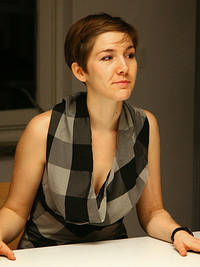

PARIS FURST
Country: USA
Programme: BA in Value Studies (2015)
Email: p.furst@ecla.de
Why did you choose ECLA?
I chose ECLA because I was looking for a rigorous course in the underpinnings of Western thought; such a concentrated parcours I had found in no other single institution. I had been trying to cobble together a series of courses and experiences, that would give me this base in arts, politics and philosophy, and ECLA was the place where I found I could do this among a very serious and motivated group of peers and engaged faculty.
What was the most interesting course for you so far and why?
The first term course The Republic and Its Interlocutors was a close study of one of the most important works of our civilization, and to discuss it in a company of other works from the period with the help of the ECLA faculty, as well as an impressive parade of guest speakers, constituted the most intense and enlightening academic experience I have had to date.
What's the most important thing you've learned at ECLA?
There will always be more to learn, so concentrate on developing the fullest understanding possible of the subjects at hand. The experience of professor-led seminars is at its richest when one has invested time and concern in the readings.
What's your favourite activity outside the classroom?
I am involved in experimental film and theater projects in Berlin, and I enjoy the wide range of cultural offerings in this progressive capital. Museums, conferences, cultural institutions, and art initiatives offer a meaningful accompaniment to the critical skills we practice at ECLA.
When/if a friend comes to Berlin, where do/would you take them?
I would take a visitor to the official cultural institutions such as museums and historical exhibits that illuminate Berlin's role in the history of Europe, but I would be sure to introduce any visitor to the vibrant creative community that thrives through small galleries and collaborative creative spaces.
In your view, what is the value of a liberal arts education?
A liberal arts education equips one to assess the present and its concerns in light of the social and intellectual past upon which all is constructed, and one must be aware of the path that has led to the present in order to meditate upon steps into the future.
